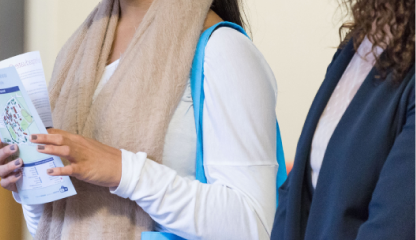Student Rights under the Family Educational Rights and Privacy Act (FERPA)
The Family Educational Rights and Privacy Act (FERPA) gives students specific rights with regard to the review, confidentiality, and release of personally identifiable information. Please see the complete NewSchool FERPA policy statement in the Academic Catalog or contact the Registrar at registrar@newschoolarch.edu or 619-684-8827 for a paper copy.
Jeanne Clery Disclosure of Campus Security Policy and Crime Statistics Act
NewSchool publishes the Annual Security Report by October first of each year. This report includes campus security-related institutional policies including those on alcohol and drug use, crime prevention, the reporting of crimes, sexual assault, and other matters. The report also includes statistics for the previous three years on federally prescribed reportable crimes as well as our annual Fire Safety Report. The report is found on NewSchool’s website here. You may also obtain a paper copy of the report by contacting the Facilities Department at facilities@newschoolarch.edu or 619-684-8886.
Americans with Disabilities Act
NewSchool follows the guidelines of the Americans with Disabilities Act (ADA) and provides reasonable accommodations to individuals who provide appropriate documentation of disabilities. If you are interested in applying to NewSchool, and require accommodation during the admissions process, an enrollment specialist will facilitate your ability to speak with NewSchool’s Disability Services Coordinator to discuss your specific needs. For information regarding services, accommodations, academic adjustments and modifications on the basis of disability, please follow this link. All inquiries will remain confidential.
Vaccination Policy
NewSchool does not require students to have specific vaccinations.
Copyright Infringement and Illegal Downloads
Unauthorized distribution of copyrighted material may subject students to civil and criminal liabilities as well as institutional sanctions. The NewSchool policy for copyright infringement and illegal downloads is available on the Legal and Consumer Information link at the bottom of NewSchool home page.
Voter Registration
The National Mail Voter Registration Form is the one document that allows you to register to vote from anywhere in the United States. Visit https://www.eac.gov/voter_resources/register_to_vote.aspx for the form and additional information.
Required Notice to Students Concerning Penalties for Drug Violations
NewSchool of Architecture & Design must provide each student written notice advising of the penalties for drug violations under The Higher Education Act (Title IV, Section 484(r)). Suspension of eligibility applies only for offenses that occur during a period of enrollment for which the student was receiving Title IV federal financial aid. The suspension applies only to federal aid and all other aid is subject to policies of the college or other fund source.
Section 484(r) SUSPENSION OF ELIGIBILITY FOR DRUG-RELATED OFFENSES
In general, a student who has been convicted of any offense under any Federal or State law involving the possession or sale of a controlled substance for conduct that occurred during a period of enrollment for which the student was receiving any grant, loan or work assistance under this title shall not be eligible to receive any grant, loan, or work assistance under this title from the date of that conviction for the period of specified in the following table:
If convicted of an offense involving the possession of a controlled substance, the ineligibility period is:
- First offense …………………………….. 1 year from date of conviction
- Second offense …………………………. 2 years from date of conviction
- Third offense ……………………………. Indefinite period
For the sale of a controlled substance, the ineligibility period is:
- First offense …………………………….. 2 years from date of conviction
- Second offense ………………………….Indefinite period
If convicted of both possessing and selling a controlled substance, and the periods of ineligibility are different, the student will be ineligible for the longer period.
REGAINING ELIGIBILITY – A student may regain eligibility for federal financial aid the day after the ineligibility ends (i.e., for a 1st or 2nd offense); or when the student successfully completes a qualified drug rehabilitation program that includes passing two unannounced drug tests given by such a program. Further drug convictions will make the student ineligible again.
Students denied eligibility for an indefinite period can regain eligibility after completing any of the following options:
- Successfully completing a rehabilitation program, as described below, which includes passing two unannounced drug tests from such a program;
- Having the conviction reversed, set aside, or removed from the student’s record so that fewer than two convictions for sale or three for possession remain on the record; or
- Successfully completing two unannounced drug tests which are part of a rehab program (the student does not need to complete the rest of the program).
A qualified drug rehabilitation program must include at least two unannounced drug tests and satisfy at least one of the following requirements:
- Be qualified to receive funds either directly or indirectly from a federal, state, or local government program;
- Be qualified to receive payment either directly or indirectly from a federally or state-licensed insurance company;
- Be administered or recognized by a federal, state, or local government agency or court; or
- Be administered or recognized by a federally or state-licensed hospital, health clinic, or medical doctor.
Drug-Free Schools and Communities Act of 1989
The Drug-Free Schools and Communities Act Amendments of 1989, as articulated in the Education Department General Regulations (EDGAR) Part 86, the “Drug-Free Schools and Campuses Regulations,” require institutions of higher education (IHEs) to develop and implement programs to prevent the abuse of alcohol and the use of illicit drugs by students, faculty, and staff. In addition, IHEs are required to provide annual notification of the provisions of their alcohol and drug abuse prevention programs to students, faculty, and staff, and to conduct biennial reviews of the programs and their effectiveness.
STANDARDS OF CONDUCT
NewSchool of Architecture & Design maintains a drug-free campus environment. Alcohol may be served at school-sponsored events, only when faculty are present and only by prior approval of the Chief Academic Officer. Students, faculty, and staff are strictly prohibited from misusing controlled substances, intoxicants, alcohol, and prescription drugs while working, participating in the on-line classroom, or other university-sponsored activities.
NewSchool recognizes the prevalence of drug and alcohol use and abuse within contemporary North American and world culture. In consideration of the NewSchool’s educational mission, we are committed to fostering an environment in which trust and open dialogue facilitate a mature and responsible engagement with issues, concerns, and problems related to drug and alcohol use. Illegal drug and alcohol use and abuse on campus pose a serious threat to the health, welfare, work, and educational progress of faculty, staff, and students and conflict with the NewSchool’s responsibility to foster a healthy atmosphere for the pursuit of education, research, and service.
NewSchool Alcohol and Other Drug Policy
NewSchool supports the responsible use of alcohol as described herein. NewSchool also supports the occurrence of non-alcoholic and drug-free activities. All students, as a condition of continued registration and enrollment, shall abide by the following:
- Students are expected to obey all state and Federal laws governing alcohol and other drug use, possession, consumption, transfer, sale, and distribution; this policy includes state or federally controlled substances as well as legal prescription drugs.
- Use, possession, or consumption of alcohol is prohibited in, classrooms, academic buildings, studios, or public areas, (e.g., corridors, lobbies, lounge areas, parking lots). The use, possession, or consumption of alcohol is prohibited at events primarily directed at the general student population and/or their families unless approved in advance in writing by the President or designee pursuant to NewSchool policy.
- The illegal use of drugs is prohibited.
- Open containers of alcohol are prohibited.
- Students shall not attend class, participate in academic out-of-classroom activities or report for scheduled work shifts while under the influence of alcohol and/or other drugs not legally prescribed for them.
- The marketing of alcoholic beverages and/or other drugs on the NewSchool campus is prohibited.
- Any students engaging in an action that is disruptive to the community or violates any other listed NewSchool policies, while under the influence of alcohol or other drugs, shall be in violation of the Alcohol and Other Drug Policy.
Sponsors of NewSchool, department, and/or off-campus functions which include faculty, staff, and students are expected to comply with all provisions of this policy and with state laws governing the consumption by or service of alcohol to minors and persons who appear intoxicated. Faculty and staff are prohibited from hosting events on- or off-campus that include the illegal use of alcohol or other drugs.
LEGAL SANCTIONS
State and Municipal Laws and Ordinances
The following provisions of the state and municipal law have guided NewSchool in the formulation of its Drug and Alcohol Prevention Program and its Alcohol and Other Drug Policy. Please note this list is not a complete summary of relevant laws and ordinances. Click here to view the full Alcohol and Drug Prevention Program notification.
- The purchase, possession, or consumption of alcoholic beverages (including beer and wine) by any person under the age of 21 is prohibited.
- The selling, either directly or indirectly, of alcoholic beverages (including beer and wine) except under the authority of a California Alcoholic Beverage Control Board license is prohibited. This includes selling glasses, mixes, ice, tickets for admission, etc.
- The serving of alcohol to an intoxicated person is prohibited.
- The serving of alcohol to someone to the point of intoxication is prohibited.
- The manufacture, use or provision of a false state identification card, driver’s license, or certification of birth or baptism is prohibited.
- The act(s) of being drunk and disorderly in public view, including on public sidewalks and walkways, is prohibited.
- The consumption of alcoholic beverages in a public place (unless licensed for consumption of alcohol on the premises) is prohibited. This includes a prohibition of alcoholic beverages in public areas of academic facilities, recreation fields, university housing corridors and lounges.
- The act of driving a motor vehicle or a bicycle while under the influence of alcohol is prohibited.
- The possession of an alcoholic beverage in an open container in a motor vehicle or on a bicycle is prohibited regardless of who is driving or whether one is intoxicated.
State and Federal Criminal Sanctions
The following is a brief summary of the state and federal criminal sanctions that may be imposed upon someone who violates the alcohol and other drug policy at NewSchool or elsewhere in the state of California.
- A violation of California law for the unlawful sale or furnishing of alcohol may include imprisonment in the county jail for a minimum of six months, plus fines and penalties.
- A violation of California law for the use of alcohol by obviously intoxicated individuals will vary with the particular circumstances but may include imprisonment in the county jail and substantial fines and penalties. Additionally, minors who are arrested for violations concerning the use of alcohol run the risk of having their driving privileges suspended or revoked.
- A violation of California law for the possession, use and/or sale of narcotics and/or other illicit drugs includes imprisonment in the county jail or state prison for up to four years, plus fines up to $2,000 for each count.
- A violation of federal law for the possession, use and/or sale of narcotics, marijuana and/or other illicit drugs may include imprisonment in the federal penitentiary for one to twenty years plus substantial financial penalties.
- The range of penalties for conviction of unlawful distribution of illicit drugs under federal law is summarized in the schedules of federal drug trafficking penalties that can be found online at https://www.dea.gov/pr/multimedia-library/publications/drug_of_abuse.pdf#page=30
A violation of the law involving an individual being under the influence of a combination of alcohol and other drugs (itself potentially deadly), may result in an increase in criminal sanctions and penalties.









 619-684-8800
619-684-8800
